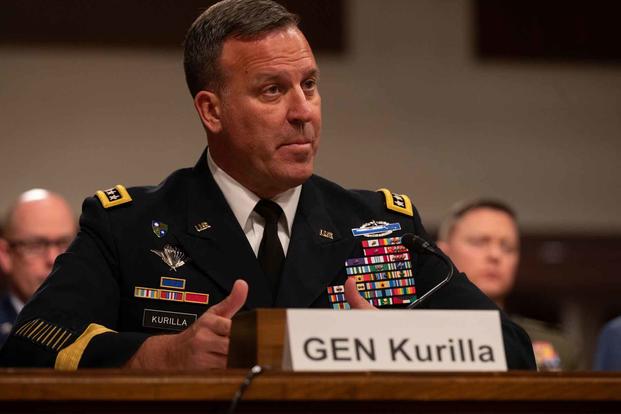The top U.S. general in the Middle East indicated Thursday that more American troops could have been killed in a recent spate of Iran-backed militia attacks in Iraq, Syria and Jordan if not for a bit of luck.
Three American soldiers were killed in a drone attack in January at a base in Jordan near the Syrian border, and scores have been injured in Iraq and Syria since a series of attacks against U.S. bases in those countries began in October. But Gen. Michael "Erik" Kurilla, the head of U.S. Central Command, suggested at a hearing Thursday those numbers would be higher if enemy drones hadn't missed their intended targets.
Asked by Sen. Roger Wicker, R-Miss., whether the militias in Iraq and Syria could have killed U.S. troops prior to the deaths in Jordan with "a little bit of extra luck," Kurilla replied, "That is correct."
Read Next: They Stood Sentry over America's Nuclear Missile Arsenal. Many Worry It Gave Them Cancer.
"There are several incidents where UAVs coming into a base hit another object, got caught up in a netting or other incidents where, had they hit the appropriate target that they were targeting, it would have injured or killed service members," Kurilla added at the Senate Armed Services Committee hearing, using the acronym for unmanned aerial vehicle.
Kurilla's comment is the latest indication that American service members in the Middle East have faced more danger than most U.S. officials have publicly acknowledged amid efforts to cool the temperature in the region while the Israel-Hamas war in the Gaza Strip rages.
After Israel launched its war in response to Hamas' Oct. 7 massacre of Israelis, Iran-backed militias in Iraq and Syria began a consistent wave of missile, rocket and drone strikes against U.S. forces in those two countries. There have been 173 attacks since October, Kurilla said Thursday.
Iran-backed Houthi rebels in Yemen also began a campaign of attacks on ships transiting the Red Sea after the Gaza war started, attacks that for the first time turned deadly this week when three civilian mariners on a merchant ship were killed Wednesday.
U.S. military officials have generally avoided describing any of the Houthi attacks as targeting American military ships, instead often describing Houthi weapons as being fired near or in the direction of the military vessels.
But one of the U.S. ships in the Red Sea, the USS Carney, was awarded a combat award, and several sailors have received medals meant to recognize "satisfactory performance under enemy fire while actively participating in a ground or surface combat engagement."
Meanwhile, at least five Purple Hearts had been awarded to service members injured in the attacks in Iraq and Syria as of December, but officials have not provided an updated total and have not said whether the troops killed and injured in Jordan are eligible for combat awards.
As of February, the Pentagon said there had been 186 U.S. casualties in Iraq, Syria and Jordan, including more than 130 traumatic brain injuries.
After the deaths in Jordan, U.S. forces struck 85 targets in Iraq and Syria associated with the militias and Iran's Islamic Revolutionary Guard Corps. U.S. forces also killed a militia leader in a strike in Baghdad.
On Thursday, Kurilla said he believes that response has reestablished deterrence with Iran in Iraq and Syria, citing intelligence sources and the fact that there has not been a new attack on U.S. troops in those countries in 32 days.
"They are deterred right now in Iraq and Syria and their support to the Iranian-aligned militia groups in terms of attacks, but necessarily in terms of funding and equipping," Kurilla said.
Still, he added, "deterrence is always temporary."
Related: Despite Deadly Attack, US Military Still Grappling with How to Handle Enemy Drones











